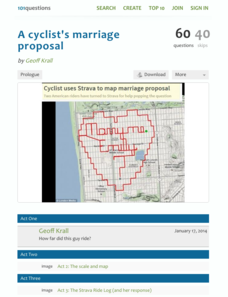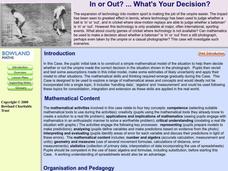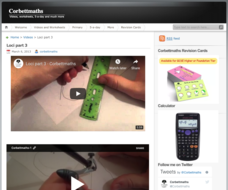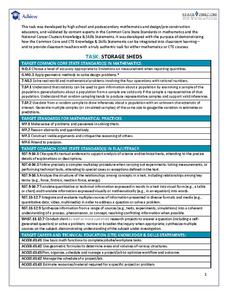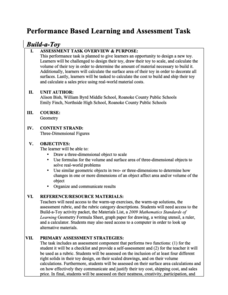Math Can Take You Places
Picture This
Engage scholars in a ratio lesson that employs real-world scenarios. Learners will compare the length and width of pictures and use a table to identify ratio patterns. They watch "Math Can Take You Places" and discuss jobs that use math...
Curated OER
Mapping It Out: Social Studies Online
A great way to introduce 2nd graders to map skills would be to use this presentation. The visuals are inviting and the layout is easy to understand. This would be a terrific way to cover the basics on how to read a map. There is also a...
Charleston School District
Constructing Dilations
Pupils multiply the vertical and horizontal distances from the center of dilation by the scale factor. The independent practice prompts the class to analyze the relationship between the image and pre-image. The lesson is...
Balanced Assessment
Multi-Figures
Apply concepts of scale and ratio to determine relationships in irregular figures. Learners determine the ratio of the perimeters of two figures composed of rectangles and circles. After, they apply similar concepts to find the ratio of...
101 Questions
A Cyclist's Marriage Proposal
One cyclist goes to great lengths to make his proposal! Your classes must figure out just what length that is. Using a map with a bike route that spells out Marry Me, learners calculate the total distance of the ride. They base their...
Curated OER
Warm Up: When Modern Human Behavior Appeared in Early Hominids
Upper graders or entry college level learners use the provided article links to answer three questions regarding early modern human behavior. They compose short essay responses that accommodate each part of the overarching question,...
Bowland
In or Out? ... What's Your Decision?
Young mathematicians use photos and video clips to determine if a cricket player is "in" or "out." This analysis occurs using scale factors, distance-rate-time formula, and consideration of precision and accuracy.
Beyond Benign
The Final Floor
Finally, the final floor plan. The 11th installment of a 15-part series looks at floor plans for houses. Scholars try their hand at creating a scale drawing for the floor plan of their dream houses.
Corbett Maths
Enlargements Using Ray Method
Figure out what to do when there is no grid to count. Using a ruler and a sharp pencil, the narrator shows how to perform a dilation when the figure is not on a grid. The ray method works by drawing a ray from the center of dilation...
Corbett Maths
Loci Part 3
How do you use a scale drawing to find the region in a lake where a treasure is located? The narrator of a short video problem identifies three criteria to determine the location of the treasure. Using a compass and ruler, he determines...
PHET
Equality Explorer: Basics
Not all interactives are made equal. Scholars use an interactive balance to explore the concept of equality. They place different objects on balances to determine the number of each object needed to balance the scale.
California Department of Education
Waves and Music
Strike the right chord with a musical activity! Instructors provide a lecture on the mechanics of a pan flute. Pupils build their own pan flutes by using straws and calculating the lengths to create a scale. After cutting the straws to...
Flipped Math
Create and Analyze Graphs
Model the world with graphs. Pupils watch and participate in creating graphs to model real-world situations. The presenters stress the importance of a consistent scale and proper labels for the graphs along with identification of the...
Bonneville
Solar Energy
Put the infinite power of the sun to good use. Young scientists learn about solar energy by completing a challenging project. They imagine that they are in charge of planning a solar panel array for a building and must decide where to...
Flipped Math
Similar Figures
Use some similar problems to find side lengths. Pupils learn the definition of similar figures and how it relates to corresponding angles and sides. Using the definition, individuals calculate the lengths of missing sides and practice...
media.yurisnight.net
Science Lesson Plan: Our Solar System: I Wonder?
Ever wonder why Pluto isn't considered a planet? Or how large the Earth is compared to the other inner planets? Explore the universe with a series of projects that simulate different aspects of our solar system. The activities require...
Achieve
Task: Storage Sheds
Bridge the gap between mathematics and Career Technical Education. Pupils research the cost associated with building storage sheds and analyze possible profit. They build scale models and determine if building and selling the sheds is a...
CK-12 Foundation
Topographic and Geologic Maps: Topographic Maps
Maps are great for helping you get where you're going, but what does that place actually look like? Geology scholars compare and contrast the features of topographical and geologic maps using an interactive lesson. The resource describes...
PBS
Human Tree: Ratios
Create a personal tree. By visiting an exhibit at the National Museum of Mathematics, the resource introduces the idea of fractals. The exhibit takes an image of the person and creates a tree by repeating scaled images on the shoulders...
Purdue University
Sound Absorption Wall
What types of materials absorb sound? Learners explore sound waves, the decibel scale, and how different materials affect sound. Then, they use their knowledge of sound meters to complete a STEM engineering design task to build...
Pace University
Grades 9-12 Earth Science
How has Earth changed over time? Pupils explore the topic in a differentiated instruction unit on the geological time scale. After a pre-assessment to gauge knowledge, class members divide into groups based on their ability levels and...
Radford University
Next Top Model
Create a world of similar models. The geometry and measurement unit uses real-world scenarios to create models of familiar buildings and rooms. Scholars work with blueprints and scale models to compare areas and volumes between the...
Radford University
Fun with Solids
Geometry is all around us—if we're only willing to look. The final three activities of the Fun with Solids unit continue work on surface area and volume. For lesson three, scholars investigate the formulas for spheres and solve a problem...
Radford University
Build-a-Toy
Don't toy with using a fun lesson. Scholars design new toys and then create scale drawings. They determine the volume and surface area of the toys, and then research prices of raw materials to estimate the manufacturing costs.
Other popular searches
- Scale Drawings
- Balance Scale
- Ph Scale
- Scale Factor
- Geologic Time Scale
- Richter Scale
- Construct Scale Drawings
- Map Scales
- Balance Scale With Grams
- Scale Models
- Using a Map Scale
- Celsius Scale




